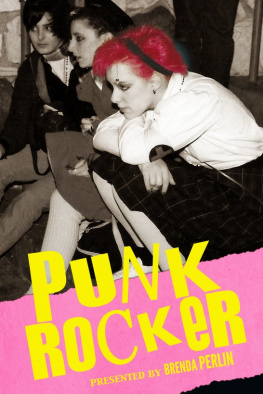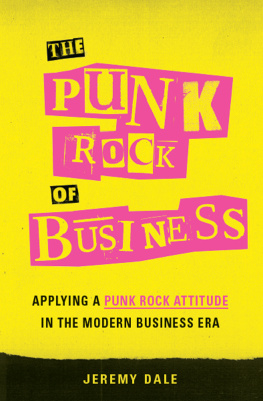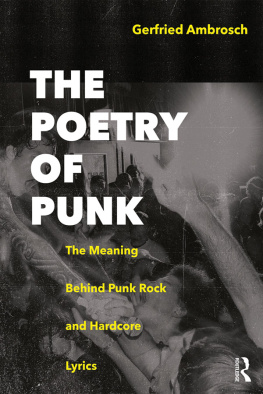Punk, Gender and Ageing
Punk, Gender and Ageing:
Just Typical Girls?
BY
LAURA WAY
University of Lincoln
United Kingdom North America Japan India Malaysia China
Emerald Publishing Limited
Howard House, Wagon Lane, Bingley BD16 1WA, UK
First edition 2020
2020 Laura Way.
Published under exclusive licence by Emerald Publishing Limited.
Reprints and permissions service
Contact:
No part of this book may be reproduced, stored in a retrieval system, transmitted in any form or by any means electronic, mechanical, photocopying, recording or otherwise without either the prior written permission of the publisher or a licence permitting restricted copying issued in the UK by The Copyright Licensing Agency and in the USA by The Copyright Clearance Center. Any opinions expressed in the chapters are those of the authors. Whilst Emerald makes every effort to ensure the quality and accuracy of its content, Emerald makes no representation implied or otherwise, as to the chapters suitability and application and disclaims any warranties, express or implied, to their use.
British Library Cataloguing in Publication Data
A catalogue record for this book is available from the British Library
ISBN: 978-1-83982-569-9 (Print)
ISBN: 978-1-83982-568-2 (Online)
ISBN: 978-1-83982-570-5 (Epub)
I would like to dedicate this to Islay. May you continue to make me smile with your quirky ways, and may you forever remain strong willed. And may you maybe, just maybe someday, come with mummy to a punk gig.
Contents
List of Figures
Author Biography
Laura Way is a Research Fellow in Family Research at the University of Lincoln. Her research centres on ageing and gender across the life course with a particular interest in punk. Further interests include creative research methodologies and punk pedagogies. She is a steering group member of the Punk Scholars Network.
Acknowledgements
First I would like to thank Jane Pilcher and Jason Hughes who supervised the PhD from which this research originates. Their academic experience and expertise was exceptionally valuable and for that I thank them. My thanks goes as well to Rose Holyoak and Francis Stewart who took time to answer questions (big and small) and just generally reassured me in moments of panic of completing this research. Thank you for sharing your own research journeys with me and helping me in moving on with my own. And a big shout out to the Punk Scholars Network for words of support and for helping me extend my involvement in punk scholarship, particularly Gords, Kirsty, Matt G., Matt W., Mike, Pete, Roy and Russ.
Thank you to my parents Sharon and Jerry. Your encouragement and support has always been important to me, and without that, this research may have never been started. Thank you for my first exposure to punk music as a kid and the lifts to gigs later down the line! Of course, my thanks also go to my partner as well as my extended family for their continued support.
I would like to extend my sincerest gratitude to the women who gave up their time to speak to me for this research. Thank you for your involvement and for being such an amazing, inspiring group of women. And thank you to the bands which helped get me through the writing of this book. In particular, thank you to Dillinger Escape Plan, Fucked Up, Gouge Away and Petrol Girls.
Introduction
This book examines the construction and maintenance of punk identities by ageing, or older, (punk) women. Scholarship on post-youth subcultural involvement demonstrates some evidence of exploring the interplay between age, gender and subculture yet still lacks any research which solely focusses on the experiences of older punk women. Historically, women have been marginalised in subcultural scholarship, and this has been more so the case for ageing, or older, women. In line with the feminist research values, the research presented here therefore gives voice to a previously marginalised sample.
Commonly, punk was theorised as both a male-dominated subculture and one which was youth centred (Hebdige, 1998). There is now growing recognition of the presence of women within punk (see, e.g., Leblanc, 2002). Additionally, the association between punk and youth has begun to change with research on older punk fans within the wider context of post-youth subcultural work (Bennett, 2006; Bennett & Hodkinson, 2012). This reflects an increasing academic interest in the ageing popular music audience more generally over the last 20 years (Bennett, 2018). Bennett (2018) notes that:
the notion of, for example, the aging rocker or the aging punk has attracted significant sociological attention, not least of all because of what this says about the shifting socio-cultural significance of rock and punk and similar genres which at the time of their emergence were inextricably tied to youth and vociferously marketed as youth musics. (p. 49)
Rather than understanding such individuals as clinging onto their youth or refusing to grow up, a cultural ageing perspective on this phenomena can serve to show instead that such youth cultural identities can provide the basis of more stable and evolving identities over the life course (Bennett, 2018, p. 49). Informed by such an approach, and indeed this academic justification, there has been some consideration of the ageing punk (Bennett, 2006, 2012, 2013). However, the very limited inclusion of older punk women in such research samples (discussed further in
1The research which this book is based on was carried out for a PhD and was granted ethical clearance from the University of Leicester. All participants received electronic information sheets and consent forms. They were asked to confirm they were happy with what the research entailed and gave consent either physically in writing, electronically or verbally. Participants were given the choice to be anonymous or to be named (justified by feminist, activist approaches to data collection/dissemination). For those wishing to be anonymous, pseudonyms were used and any identifying details removed or changed. For those wanting to be named, first names only have been used.
Within the publication there are three photographs. The first two of clothing were taken by myself, the researcher, and feature no identifiable individual. The third is also a photograph I took this was a photo of a printed image the participant gave to me to keep.
Chapter 1
Playing A-Minor in the Punk Scene or All Girls to the Front? An Introduction
Well, I figured, if Im gonna grow old, Im gonna do it as disgracefully as I can. (Sam, late forties)
The primary reason for beginning this research was that when I explored literature concerning ageing, punk and gender, voices such as Sams were absent. Punk originally was theorised as both a male-dominated subculture and one which was youth centred (Hebdige, 1998), and whilst both of these elements have since been challenged in subcultural scholarship, there still appears to be limited analysis which brings ageing punk women to the fore. This research is concerned with filling that gap.












